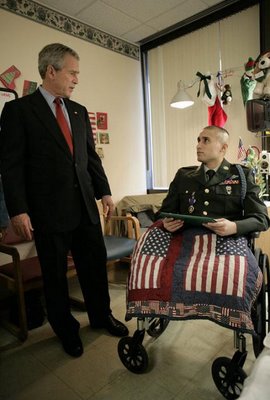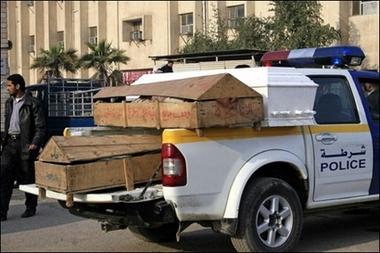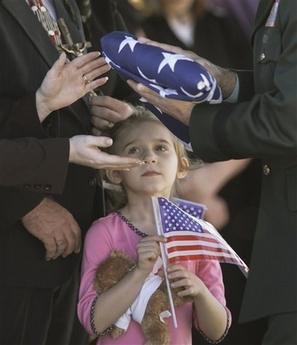Tinderbox
The Mahdi is simmering and waiting to explode.
On Friday night, a curfew was imposed in Samawa but was widely ignored. On Saturday, the Mahdi Army appeared to be in control of the northern half of the city.
The Mahdi is simmering and waiting to explode.
On Friday night, a curfew was imposed in Samawa but was widely ignored. On Saturday, the Mahdi Army appeared to be in control of the northern half of the city.

Top U.S. military commanders in Iraq have decided to recommend a "surge" of fresh American combat forces, eliminating one of the last remaining hurdles to proposals being considered by President Bush for a troop increase, a defense official familiar with the plan said Friday.
The approval of a troop increase plan by top Iraq commanders, including Gen. George W. Casey Jr. and Lt. Gen. Raymond T. Odierno, comes days before Bush unveils a new course for the troubled U.S. involvement in Iraq. Bush still must address concerns among some Pentagon officials and overcome opposition from Congress, where many Democrats favor a blue-ribbon commission's recommendation for the gradual withdrawal of combat troops.
Interviews with U.S. officials and knowledgeable Iran watchers indicate the stepped up measures are meant for now as a message to Iran to step back from an alleged up-tick in its recent efforts to destabilize Iraq, Lebanon, and the Palestinian territories, and to prevent Iran from taking retaliatory actions against the anticipated sanctions like, for instance, closing off the Straits of Hormuz....
A U.S. official indicated that one reason for the perceived need to demonstrate a show of force towards Iran now is to counter the perception in the region, generated in part from coverage of the Iraq Study Group report, that the Bush administration was coming under increased domestic pressure to offer concessions to Iran and Syria. “People in the region read the ISG report and thought the Americans are surrendering,” this official said. “Nothing could be further from the truth.” ....
Lt. Gen. Keith Dayton, the U.S. security coordinator to Israel and the Palestinian Authority, told the Israeli daily Yedioth Ahronoth after news of the training sessions leaked out that since Iran is helping arm and fund Hamas political and military activities, the United States wants to prevent "moderate forces" in the Palestinian territories from being eliminated.

The Selective Service System is planning a comprehensive test of the military draft machinery, which hasn't been run since 1998.
British intelligence and law enforcement officials have passed on a grim assessment to their U.S. counterparts, "It will be a miracle if there isn't a terror attack over the holidays in London," a senior American law enforcement official tells ABCNews.com.
Radical Shiite cleric Muqtada al-Sadr, who heads a militia feared by Iraq's Sunnis, is considering a one-month unilateral cease-fire and may push his followers to rejoin the political process after a three-week boycott, officials close to him said.
They question whether Hakim can counter Sadr's growing street power without worsening the chaos. As President Bush ponders limited alternatives in forging a new approach in Iraq, some wonder whether the United States is overestimating Hakim's ability......
The largest oil operator in Nigeria, Royal Dutch Shell, evacuated expatriate staff dependants from the Niger Delta on Thursday after militants planted a car bomb in a residential compound, the company said.
Iraq's Shiite prime minister, Nouri al-Maliki, has created a two-pronged security plan for Baghdad in which U.S. forces would aggressively target Sunni Arab insurgents instead of Shiite militias. At the same time, Maliki would intensify his efforts to weaken Shiite cleric Moqtada al-Sadr and contain his Mahdi Army militia, Iraqi officials said Tuesday.
Under these conditions, Maliki would accept a surge in U.S. troops in Baghdad, according to two Maliki advisers with knowledge of the plan.
A shuffle of top American generals in Iraq is likely to accompany the shift in U.S. policy that President Bush is considering.


Rumsfeld, Kagan said, "saw soldiers as detracting from the transformation program he wanted the military to go through."
Prime Minister Nuri Kamal al-Maliki and his Shiite party, Islamic Dawa, are hesitant about signing on to the coalition. Dawa members say they are concerned that rival Shiite parties are trying to oust Mr. Maliki. They also suspect the Sunni Arabs’ real goal is to erode Shiite power.
The Pentagon confirmed today that a Michigan soldier missing in Iraq since late October probably was captured by the enemy.....
It's believed that an anti-American Shiite militia snatched him off the street while he was visiting his Iraqi wife in Baghdad on October 23rd.

The Bush administration is split over the idea of a surge in troops to Iraq, with White House officials aggressively promoting the concept over the unanimous disagreement of the Joint Chiefs of Staff, according to U.S. officials familiar with the intense debate.

U.S. military and intelligence officials have systematically underreported the violence in Iraq in order to suit the Bush administration's policy goals, the bipartisan Iraq Study Group said.....
Q Tony, when does Secretary Gates go to Iraq, tomorrow?
MR. SNOW: One thing you never do is announce when somebody is going to go to Iraq.
But advocates of the "victory-still-possible" approach received a bucketful of cold water Sunday from one of the chief architects of the allied victory in the 1991 Gulf War, former chairman of the Joint Chiefs of Staff Colin Powell.

The U.S. military is rehearsing for hearings on whether 14 top terror suspects can be held indefinitely without charge as enemy combatants, but defense lawyers say the outcome is preordained.
A British investigation into a controversial arms deal with Saudi Arabia was stopped because Riyadh threatened to withdraw all co-operation on security and intelligence, a newspaper has reported.
But officials with the Red Cross and other aid groups in Mogadishu report seeing "many Americans with thick necks and short haircuts moving around, carrying big suitcases," says one aid official whose agency does not permit him to speak on the record.
This year, we invited readers on our Web site to ask you questions. Here's one:
Nina Frazier of New Braunfels, Texas, asks: If you believe in the war, why didn't you encourage your own daughters to fight for your country? Or did you?
THE PRESIDENT: I believe Americans can contribute to the security and well-being of our country in a variety of ways. That's why we have a volunteer army. What we say to young people is that if you want to serve your country you can do so in the military, or you can do so by teaching children in inner-city Washington, D.C., like one of our daughters did. Or you can help form education programs in New York City, like our (other) daughter. There are all kinds of ways to serve.
Are your daughters coming home for Christmas?
Mrs. Bush: They are. Jenna is working with an international organization in Central and South America about education policy. And Barbara is working for a museum in the education department.
The US uses its aid budget to bribe those countries which have a vote in the United Nations security council, giving them 59 per cent more cash in years when they have a seat, according to research by economists.....
When there is a controversial vote in prospect, the premium for countries with a security council seat is even higher. US aid surges by as much as 170 per cent, bringing in a £23m windfall, while the UN spends an extra £4m.

Two of the biggest Episcopal parishes in Virginia are poised to break from the denomination to join overseas Anglicans forming a conservative U.S. rival to The Episcopal Church.....
The feud erupted in 2003 when Episcopalians consecrated the first openly gay bishop, V. Gene Robinson of New Hampshire. ....
The archbishop hopes to create a U.S. alliance of disaffected parishes called the Convocation of Anglicans in North America.